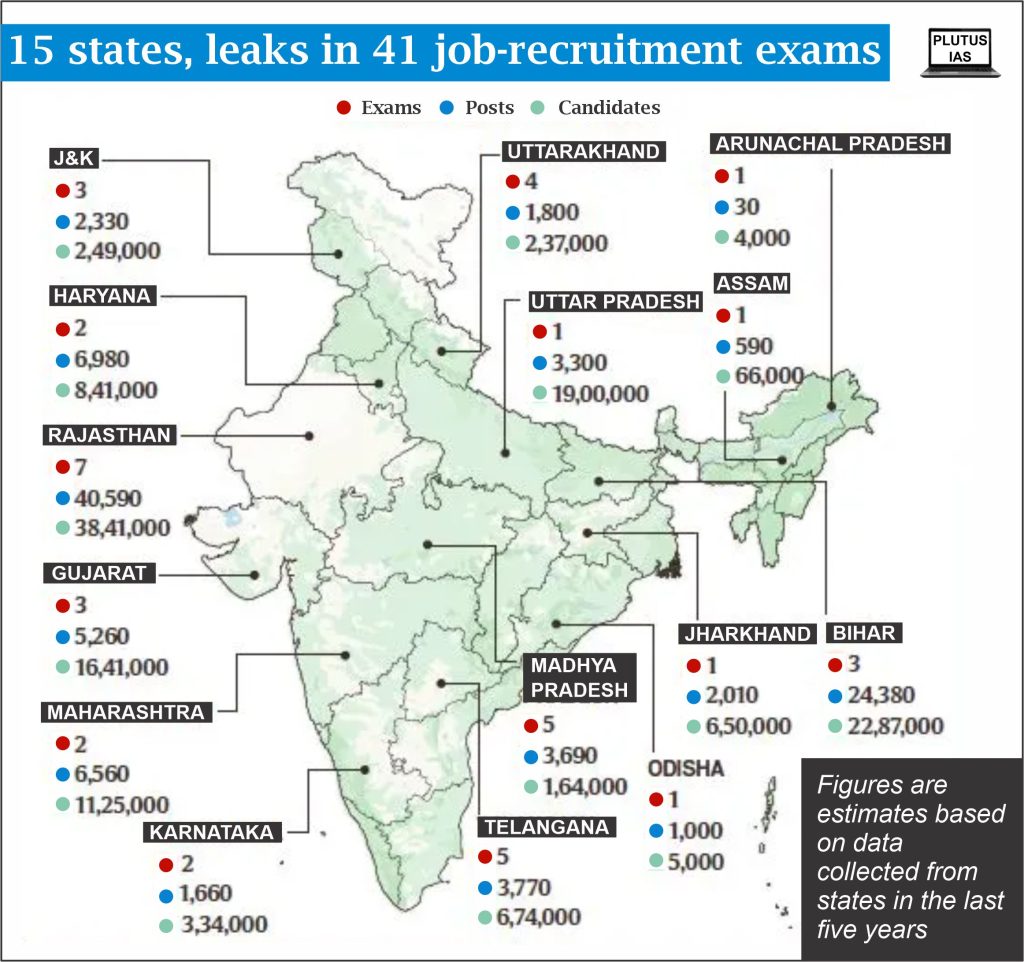07 Feb Public Examinations (Prevention of Unfair Means) Bill 2024
This article covers ‘Daily Current Affairs’ and the topic details of “Public Examinations (Prevention of Unfair Means) Bill 2024,”.This topic is relevant in the “Polity & Governance” section of the UPSC CSE exam.
Why in the News?
The Public Examinations (Prevention of Unfair Means) Bill, 2024, was tabled in the Lok Sabha by Union Minister Jitendra Singh. The bill stipulates that cheating and irregularities in competitive examinations will result in a maximum sentence of 10 years in prison and a fine of up to Rs 1 million.
Background
- Over five years, there have been at least 48 examples of exam leaks in 16 states. More than 1.5 crore people applied for 1.2 lakh openings.
- Long wait times between cancellation and re-exams (up to two years). It causes uncertainty and distress to aspirants and families.
- Few arrests have been made, and investigations continue without resolution. Identifies flaws in the secure administration of infallible tests.

Key provisions of the Public Examinations Bill
- The Bill aims to improve openness, fairness, and reliability in public examinations, as well as reassure youth that their hard work will be rewarded and their future is secure.
- The bill applies to central recruitment and entrance exams held by the Union Public Service Commission (UPSC), Staff Selection Commission (SSC), Railway Recruitment Boards (RRBs), Institute of Banking Personnel Selection (IBPS), and National Testing Agency (NTA).
- In addition to the approved public examination authority, the new rule will apply to all central ministries and departments, as well as their recruitment offices.
Punishments:
- The bill imposes a three- to five-year prison sentence for involvement in paper leak instances. However, if a link to organised crime is confirmed, a prison sentence of up to ten years is imposed.
- It charges a Rs 1 crore fine and recovers inspection costs from firms.
- It further states that if convicted, a corporation may be restricted from giving public exams for years.
Section 9 of the Bill addresses the nature of offences under the new legislation. Offences under the new bill are cognizable, non-bailable, and non-compoundable.
- Cognizable: arrest without a warrant is possible.
- Non-bailable: bail is not guaranteed. A magistrate will decide if the accused is eligible for bail.
- Non-compoundable offences: It cannot be withdrawn by the complainant, even if both parties reach an agreement. A trial will undoubtedly follow for the accused.
Investigation
- The law proposes that officials not under the level of deputy superintendent of police or assistant commissioner of police oversee such cases.
- According to the measure, the government can also refer the investigation to a central agency.
- In essence, this allows the police to act on their own and arrest people without a warrant.
What are the advantages of the Public Examinations (Prevention of Unfair Means) Bill 2024?
- The measure will reassure young people that their honest and genuine efforts in public examinations will be fairly rewarded.
- The hefty punishments and fines will dissuade the country’s organised paper leak crime mafia. They will be deterred from attempting to exploit the examination system’s flaws.
- The bill proposes the formation of a high-level National Technical Committee on public examinations, which will offer suggestions to improve the security of the computerised examination process.
- It will prevent question paper leaks in recruiting examinations.
Concerns with the Bill
- Loopholes– The bill exempts students from facing criminal sanctions. They have been placed under the administrative rules of the relevant public examination authority. However, paper-leak gang members may use this loophole by appearing as students and avoiding hefty criminal penalties.
- Discretion of state governments– The measure allows state governments to design their own acts using the model bill as a guideline. However, state governments have already shown partisan interests in writing model legislation, such as the Model APLM Act.
- Scope of subordinate legislation– The law allows for the creation of subordinate legislation, such as rules under the act. The executive authorities will have significant discretion in implementing the statute.
- The bill does not specify the composition or qualifications of the National-Technical Committee on Public Exams members. The central government’s selection of members may be partisan.
Download plutus ias current affairs eng med 7th Feb 2024
Prelims practice question
Q1) Consider the following statements:
1) Justice Verma Committee recommended the implementation of the Common Eligibility Test
2) The primary objective of introducing the Common Eligibility Test is to enhance the competitiveness in the private sector
3) NTA was established in 2018.
How many of the above statements are correct?
a) One
b) Two
c) Three
d) None
ANSWER: C
Mains practice question
Q1) Analyze the role of media and social platforms in the spread of leaked exam content. Discuss the ethical responsibilities of media outlets and social media platforms in preventing the dissemination of such materials.
I am a content developer and have done my Post Graduation in Political Science. I have given 2 UPSC mains, 1 IB ACIO interview and have cleared UGC NET JRF too.



No Comments